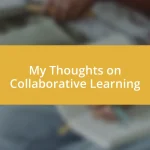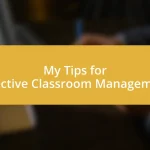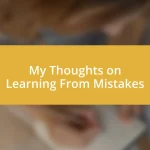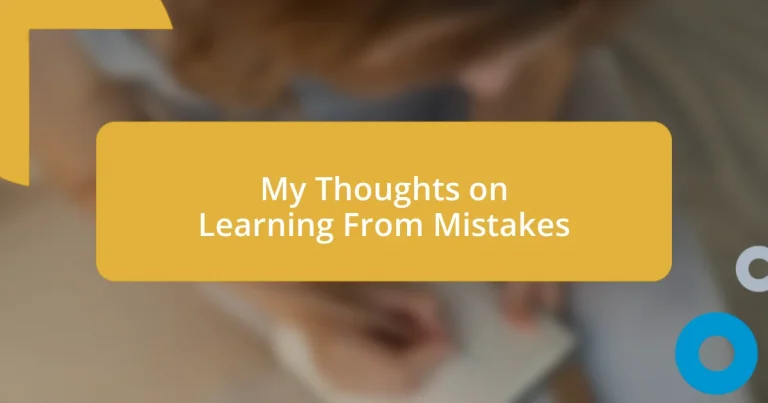Key takeaways:
- Mistakes are valuable learning opportunities that foster personal growth and resilience when approached positively.
- Analyzing errors through strategies like keeping an error journal and conducting post-mortem analyses enhances understanding and improves future performance.
- Creating a culture of learning by openly sharing experiences, encouraging curiosity, and celebrating small wins strengthens team dynamics and collective growth.
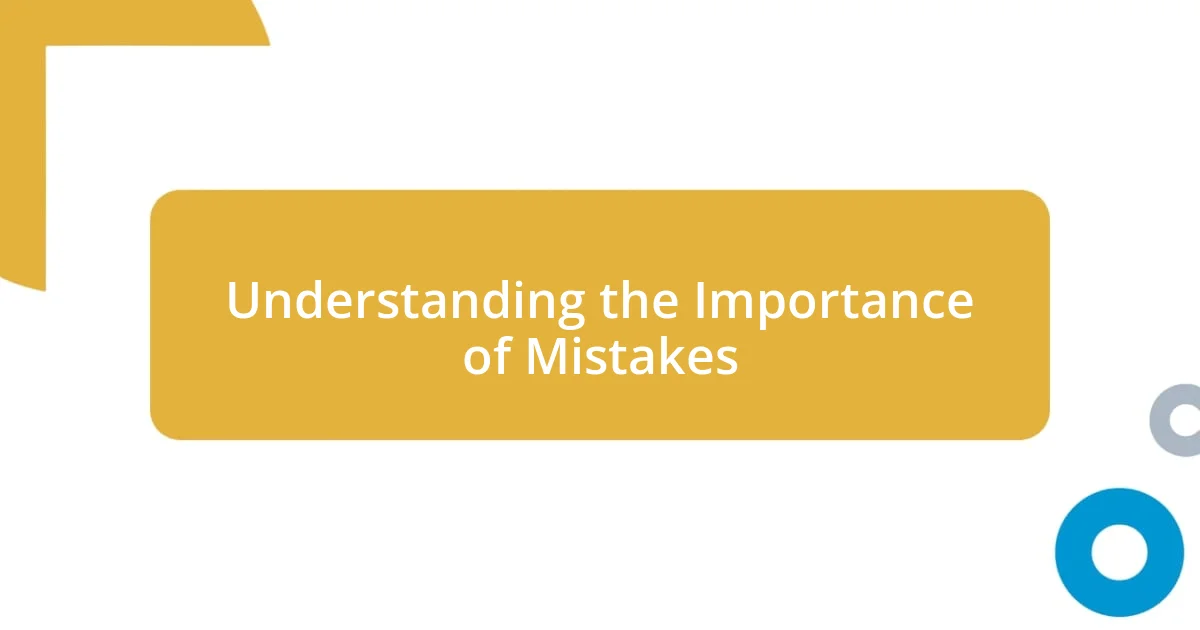
Understanding the Importance of Mistakes
Mistakes are often seen as failures, but I believe they are stepping stones to growth. I remember a time in my early career when I messed up a major project presentation. Initially, I felt embarrassed and defeated, but that experience taught me invaluable lessons about preparation and communication.
When we make mistakes, we’re offered a front-row seat to our own learning processes. Have you ever noticed how the sting of a misstep can lead us to examine our choices more critically? I’ve found that reflecting on my errors not only deepens my understanding of the task at hand but also hones my problem-solving skills in ways I never expected.
Embracing mistakes cultivates resilience, something I didn’t fully appreciate until I faced a setback in a personal project. Instead of giving up, I sought feedback and adjusted my approach. That experience highlighted how mistakes, when viewed through a positive lens, can actually illuminate paths to success, guiding us to become better versions of ourselves.
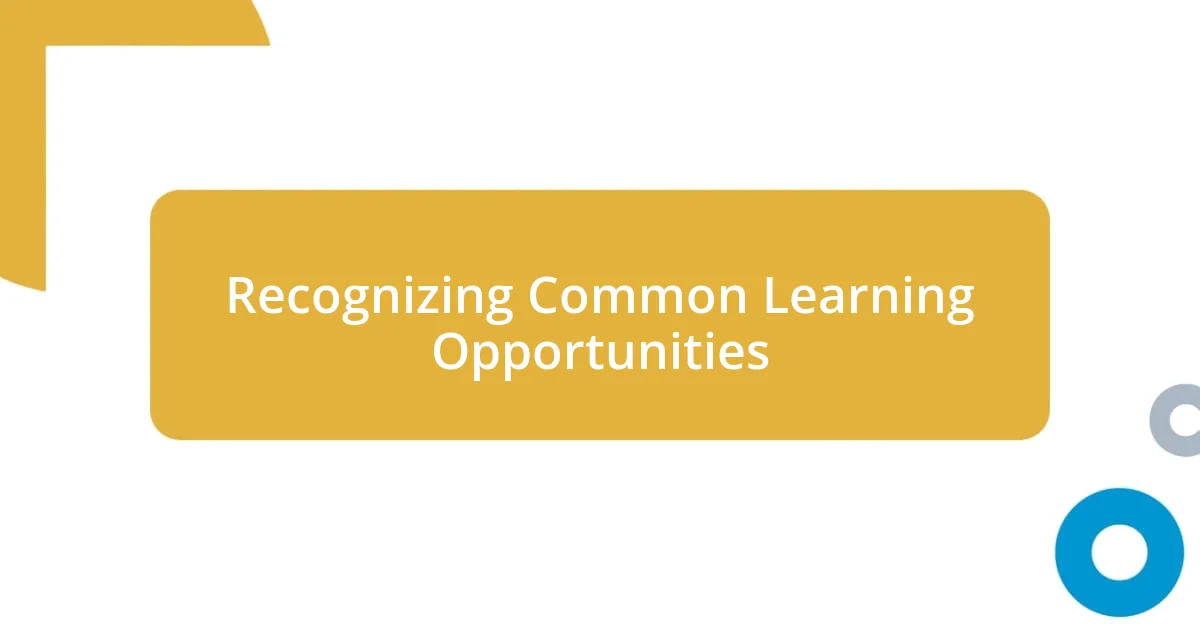
Recognizing Common Learning Opportunities
When it comes to learning from mistakes, I’ve noticed certain patterns that frequently crop up. For instance, missing deadlines often reveals gaps in time management skills. I recall a time I underestimated the time needed for a project; the last-minute scramble taught me not only to plan better but also to anticipate potential obstacles.
Here are some common learning opportunities I’ve identified through my experiences:
– Communication breakdowns can uncover areas for improved clarity.
– Overconfidence may lead to oversight, reminding us to stay humble and open-minded.
– Misjudging audience preferences highlights the importance of empathy and understanding in our interactions.
– Failing to delegate effectively shows us the limits of our capabilities and the strength of teamwork.
– Ignoring feedback illustrates the need to embrace constructive criticism for growth.
By recognizing these opportunities, I believe we can transform our missteps into powerful lessons that drive our development forward.
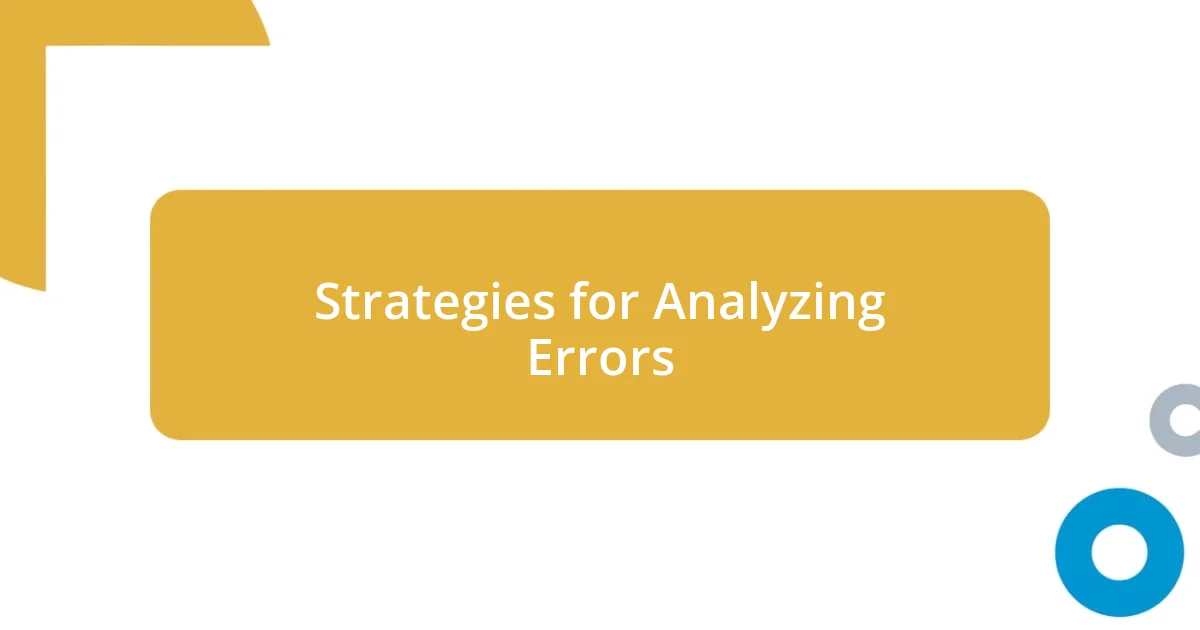
Strategies for Analyzing Errors
When analyzing errors, one effective strategy is to keep a detailed error journal. I began this habit after a particularly challenging semester in college. By tracking what went wrong and my emotional responses, I gained insights into my learning style and areas that needed attention. It has since helped me navigate obstacles and sparked a more critical approach to my studies.
Another powerful method is the practice of conducting a “post-mortem” after completing projects or tasks. I remember leading a team where communication faltered, resulting in a project’s incomplete elements. Reflecting together afterward uncovered the misunderstandings and revealed insights that improved our teamwork for future endeavors. Sharing the lessons learned ensures the group evolves collectively.
Asking questions is vital in this process. I’ve adopted the habit of questioning my choices after mistakes, like, “What could I have done differently?” or “What did I overlook?” This often feels uncomfortable but is essential for honest self-reflection and growth. It’s a bit like peeling back layers to find the core of the issue, and I’ve found it leads to deeper understanding and better future decisions.
| Strategy | Description |
|---|---|
| Error Journal | Keeping a record of mistakes and emotional responses to identify patterns and learning opportunities. |
| Post-Mortem Analysis | Reviewing completed projects to understand what went wrong and how to improve teamwork and processes. |
| Reflective Questioning | Asking targeted questions about decisions and actions to foster deeper insights and growth. |
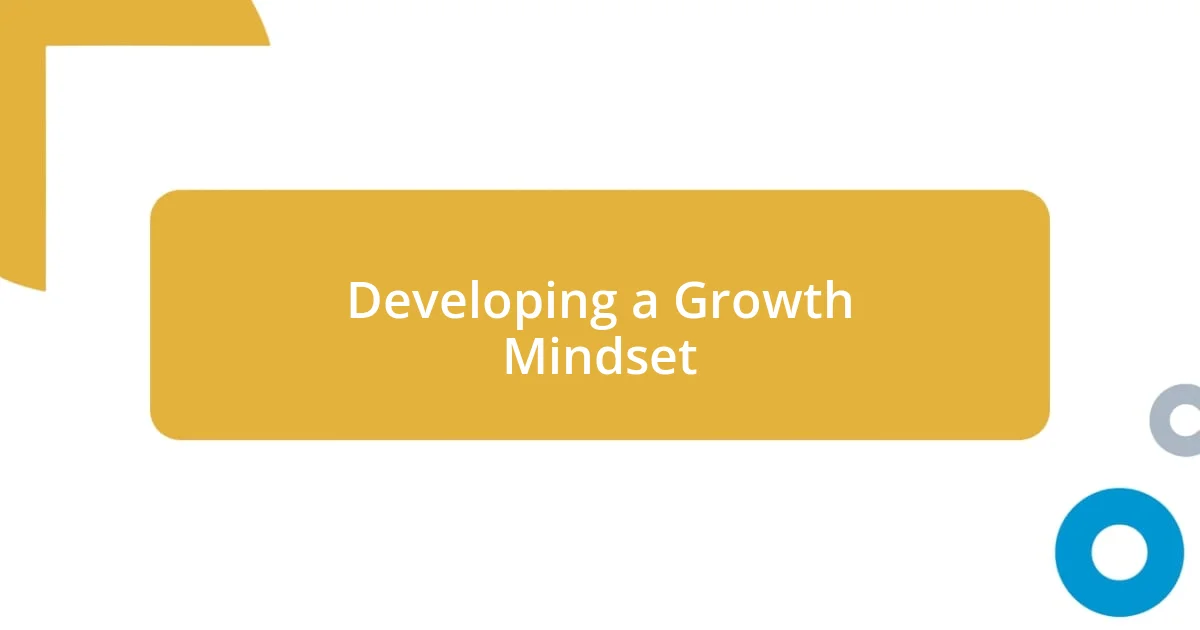
Developing a Growth Mindset
Embracing a growth mindset has been a game-changer in my learning journey. I vividly remember a moment when I failed a crucial exam, feeling deflated and questioning my abilities. But instead of wallowing in regret, I asked myself, “What can I learn from this?” That question shifted my perspective entirely, leading me to seek out help and resources that I had previously ignored.
I’ve found that real growth happens when we step outside our comfort zones. For instance, attempting a challenging project pushed me to collaborate with peers who had expertise in areas I didn’t. It was intimidating at first, but I learned the value of vulnerability and that asking for help is not a sign of weakness; it’s a stepping stone toward improvement. Actively seeking out constructive feedback rather than avoiding it has also transformed my approach to learning. Have you ever experienced that moment when feedback stings but ultimately propels you forward?
With each mistake, I remind myself that it’s part of the process. Like a sculptor chiseling away at a block of marble, every misstep reveals new facets of potential. I recall a time when I mismanaged a group assignment. Rather than letting it slide into frustration, I took the opportunity to encourage an open dialogue about our communication. This wasn’t just about fixing the issue; it was about building trust and learning collectively. Each misjudgment can serve as a valuable lesson, paving the way for personal and collaborative growth if we approach them with an open heart and mind.
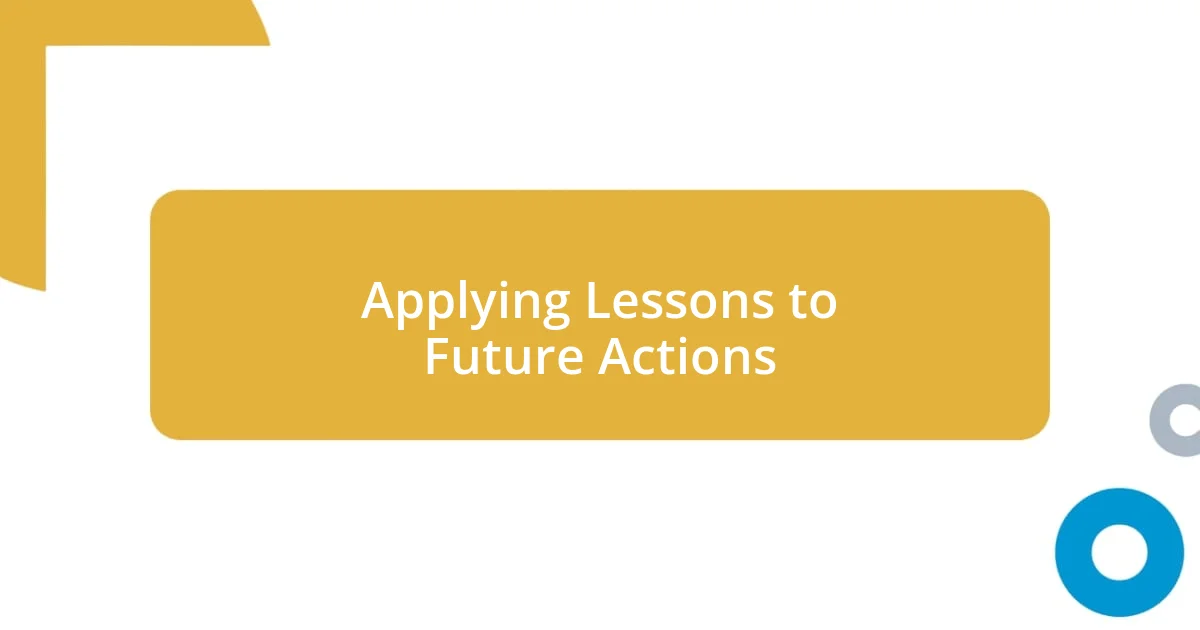
Applying Lessons to Future Actions
One of the most impactful ways I apply lessons learned is by setting practical goals informed by my past mistakes. I recall a time when my procrastination led to frantic last-minute studying, which only fueled my anxiety. To combat this, I now create a structured study schedule that breaks down tasks into manageable chunks. It’s fascinating how transforming a negative experience into a proactive plan can shift your trajectory; I’ve found that clearer goals elevate my focus and reduce stress significantly.
Another technique that has served me well is visualizing the outcome of specific actions before I undertake them. I remember a presentation where I overlooked key details, regretting my lack of preparation. Now, before tackling any similar task, I mentally walk through each step, envisioning potential pitfalls I might encounter. This practice not only boosts my confidence but also allows me to approach challenges with a sense of anticipation. Isn’t it incredible how a bit of mental rehearsal can set the stage for success?
Connecting with peers to share insights about past mistakes has also reshaped my future actions. In my experience, discussing blunders with friends can yield unexpected wisdom. I once opened up about my struggles with time management, and my peers shared their strategies, like using timers or productivity apps. Those conversations sparked new approaches that I still implement today. Have you ever thought about how sharing experiences can deepen your understanding? It’s truly enlightening, demonstrating that we don’t have to navigate the learning process alone.
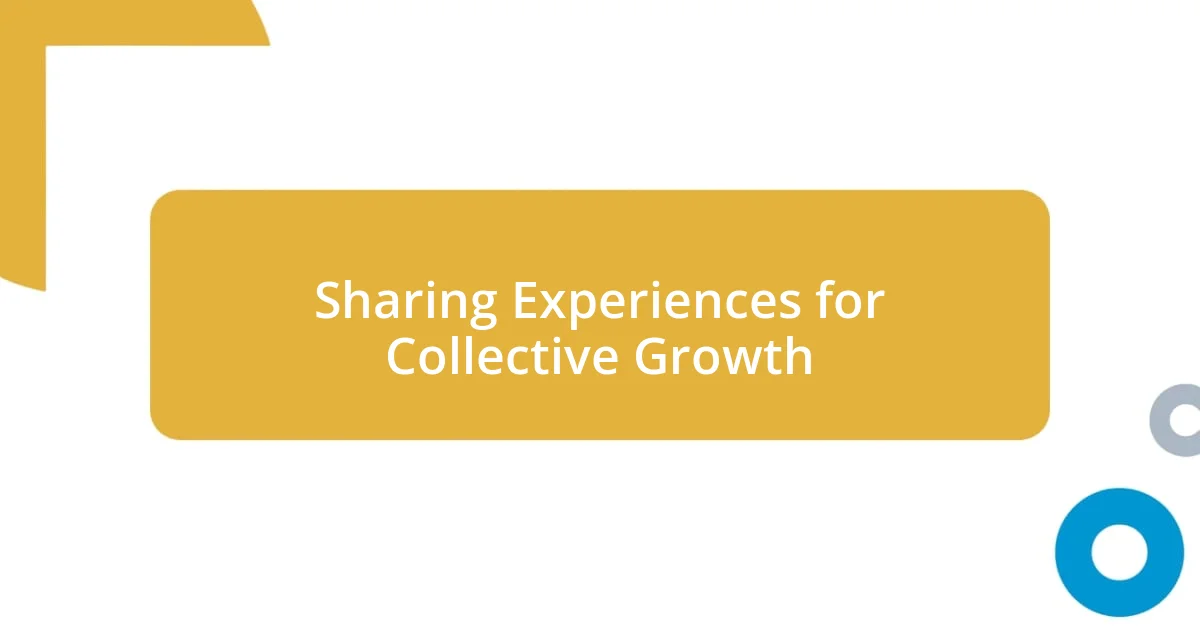
Sharing Experiences for Collective Growth
When I think about sharing experiences, I’m often reminded of a workshop I attended where participants shared their biggest failures. It felt like peeling back layers of vulnerability; hearing others discuss their setbacks made me reflect on mine in a completely different light. It was liberating to realize that we’re all navigating the same turbulent waters. Have you ever felt that rush of relief when someone else’s story mirrors your own struggles? That camaraderie fosters a stronger sense of community, paving the way for genuine collective growth.
In another instance, I once led a group discussion after a project that didn’t meet our expectations. Instead of pointing fingers, I encouraged everyone to share what went wrong and what could be done differently. Surprisingly, this opened the floodgates for everyone to voice their opinions. It turned into a rich dialogue that not only clarified our failings but also crafted a united approach for our next endeavor. Isn’t it amazing how a simple conversation can transform a group dynamic and enhance our learning curves together?
These shared experiences don’t just build trust; they spark innovation. I once collaborated with a colleague who had completely different methodologies, and through sharing our past mistakes, we developed a unique project that incorporated the best of both worlds. Reflecting on our missteps led us to think outside the box and fuel creativity. How often do you engage in conversations that enrich not just your understanding but also your collaborative efforts? Together, sharing blunders can illuminate pathways to solutions we might never have considered alone.
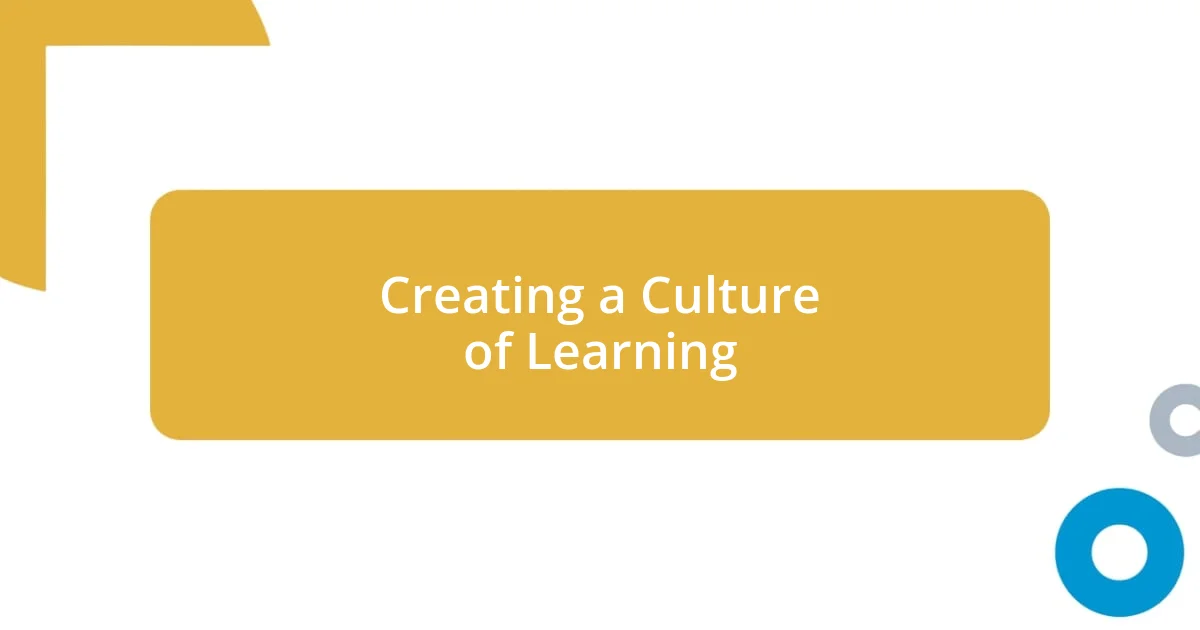
Creating a Culture of Learning
Creating a supportive environment for growth often begins with recognizing mistakes as stepping stones rather than setbacks. I remember an occasion when a miscommunication led to a project delay for my team. Instead of pointing fingers, we gathered for a candid discussion where everyone highlighted their learnings. That moment taught me the power of vulnerability; it transformed our mistakes into collective wisdom, reinforcing our bond as teammates. Have you ever experienced how openly addressing failures can pave the way for stronger relationships?
Encouraging curiosity is another vital aspect of fostering a culture of learning. I once attended a seminar where we were prompted to ask “what if?” questions about our past failures. I was struck by how this simple shift in mindset opened up entirely new avenues for exploration. When I started asking myself what I could try differently, I found that not only did my problem-solving skills enhance, but my confidence also soared. Isn’t it fascinating how the right questions can unlock hidden potential in us?
Lastly, celebrating small wins plays a crucial role in maintaining momentum in any learning culture. I remember when our team wrapped up a challenging project; we took a moment to recognize each person’s contribution, including the lessons learned from our missteps. This acknowledgment of growth made us more resilient and enthusiastic about tackling future challenges. How often do you pause to celebrate progress, even if it’s just a small step? It’s amazing how such practices can reinforce a mindset of continuous improvement and foster an inclusive atmosphere for learning.





